#Simulation Training in Metaverse
Explore tagged Tumblr posts
Text
In today’s rapidly evolving technological landscape, Metaverse technology is ushering in new dimensions for industries worldwide. As businesses adopt immersive digital environments for training, simulations, and customer experiences, one metaverse company in India is truly making its mark — Simulanis. This company specializes in creating cutting-edge metaverse development solutions and virtual reality (VR) simulators, transforming industries from fire safety to pharmaceutical training.
#Virtual Reality Safety Training#Immersive VR Simulators#VR Training for Firefighters#Metaverse Training Solutions#Virtual Reality Fire Training#Industrial VR Simulators#VR Training for Paint Spraying#VR Fire Extinguisher Simulator#Virtual Reality Emergency Training#VR-based Skill Training#Metaverse for Workforce Development#3D VR Simulators#Fire Safety VR Training Programs#Virtual Reality for Hazardous Training#Immersive VR Training for Manufacturing#Augmented Reality Productivity Tools#Metaverse Learning Experiences#Virtual Fire Safety Training India#VR Training for Healthcare#Simulation Training in Metaverse#Realistic VR Fire Training Simulators#Advanced VR Training Solutions#Virtual Reality Training for Engineers#Industrial Fire Extinguisher Simulator#Pharmaceutical VR Training Simulators#VR Training for High-Risk Jobs#Fire Safety Simulation Tools#Remote Assistance in VR Training#Metaverse Development for Enterprises#Immersive VR Training for Safety Procedures
0 notes
Text
The Metaverse: A New Frontier in Digital Interaction

The concept of the metaverse has captivated the imagination of technologists, futurists, and businesses alike. Envisioned as a collective virtual shared space, the metaverse merges physical and digital realities, offering immersive experiences and unprecedented opportunities for interaction, commerce, and creativity. This article delves into the metaverse, its potential impact on various sectors, the technologies driving its development, and notable projects shaping this emerging landscape.
What is the Metaverse?
The metaverse is a digital universe that encompasses virtual and augmented reality, providing a persistent, shared, and interactive online environment. In the metaverse, users can create avatars, interact with others, attend virtual events, own virtual property, and engage in economic activities. Unlike traditional online experiences, the metaverse aims to replicate and enhance the real world, offering seamless integration of the physical and digital realms.
Key Components of the Metaverse
Virtual Worlds: Virtual worlds are digital environments where users can explore, interact, and create. Platforms like Decentraland, Sandbox, and VRChat offer expansive virtual spaces where users can build, socialize, and participate in various activities.
Augmented Reality (AR): AR overlays digital information onto the real world, enhancing user experiences through devices like smartphones and AR glasses. Examples include Pokémon GO and AR navigation apps that blend digital content with physical surroundings.
Virtual Reality (VR): VR provides immersive experiences through headsets that transport users to fully digital environments. Companies like Oculus, HTC Vive, and Sony PlayStation VR are leading the way in developing advanced VR hardware and software.
Blockchain Technology: Blockchain plays a crucial role in the metaverse by enabling decentralized ownership, digital scarcity, and secure transactions. NFTs (Non-Fungible Tokens) and cryptocurrencies are integral to the metaverse economy, allowing users to buy, sell, and trade virtual assets.
Digital Economy: The metaverse features a robust digital economy where users can earn, spend, and invest in virtual goods and services. Virtual real estate, digital art, and in-game items are examples of assets that hold real-world value within the metaverse.
Potential Impact of the Metaverse
Social Interaction: The metaverse offers new ways for people to connect and interact, transcending geographical boundaries. Virtual events, social spaces, and collaborative environments provide opportunities for meaningful engagement and community building.
Entertainment and Gaming: The entertainment and gaming industries are poised to benefit significantly from the metaverse. Immersive games, virtual concerts, and interactive storytelling experiences offer new dimensions of engagement and creativity.
Education and Training: The metaverse has the potential to revolutionize education and training by providing immersive, interactive learning environments. Virtual classrooms, simulations, and collaborative projects can enhance educational outcomes and accessibility.
Commerce and Retail: Virtual shopping experiences and digital marketplaces enable businesses to reach global audiences in innovative ways. Brands can create virtual storefronts, offer unique digital products, and engage customers through immersive experiences.
Work and Collaboration: The metaverse can transform the future of work by providing virtual offices, meeting spaces, and collaborative tools. Remote work and global collaboration become more seamless and engaging in a fully digital environment.
Technologies Driving the Metaverse
5G Connectivity: High-speed, low-latency 5G networks are essential for delivering seamless and responsive metaverse experiences. Enhanced connectivity enables real-time interactions and high-quality streaming of immersive content.
Advanced Graphics and Computing: Powerful graphics processing units (GPUs) and cloud computing resources are crucial for rendering detailed virtual environments and supporting large-scale metaverse platforms.
Artificial Intelligence (AI): AI enhances the metaverse by enabling realistic avatars, intelligent virtual assistants, and dynamic content generation. AI-driven algorithms can personalize experiences and optimize virtual interactions.
Wearable Technology: Wearable devices, such as VR headsets, AR glasses, and haptic feedback suits, provide users with immersive and interactive experiences. Advancements in wearable technology are critical for enhancing the metaverse experience.
Notable Metaverse Projects
Decentraland: Decentraland is a decentralized virtual world where users can buy, sell, and develop virtual real estate as NFTs. The platform offers a wide range of experiences, from gaming and socializing to virtual commerce and education.
Sandbox: Sandbox is a virtual world that allows users to create, own, and monetize their gaming experiences using blockchain technology. The platform's user-generated content and virtual real estate model have attracted a vibrant community of creators and players.
Facebook's Meta: Facebook's rebranding to Meta underscores its commitment to building the metaverse. Meta aims to create interconnected virtual spaces for social interaction, work, and entertainment, leveraging its existing social media infrastructure.
Roblox: Roblox is an online platform that enables users to create and play games developed by other users. With its extensive user-generated content and virtual economy, Roblox exemplifies the potential of the metaverse in gaming and social interaction.
Sexy Meme Coin (SEXXXY): Sexy Meme Coin integrates metaverse elements by offering a decentralized marketplace for buying, selling, and trading memes as NFTs. This unique approach combines humor, creativity, and digital ownership, adding a distinct flavor to the metaverse landscape. Learn more about Sexy Meme Coin at Sexy Meme Coin.
The Future of the Metaverse
The metaverse is still in its early stages, but its potential to reshape digital interaction is immense. As technology advances and more industries explore its possibilities, the metaverse is likely to become an integral part of our daily lives. Collaboration between technology providers, content creators, and businesses will drive the development of the metaverse, creating new opportunities for innovation and growth.
Conclusion
The metaverse represents a new frontier in digital interaction, offering immersive and interconnected experiences that bridge the physical and digital worlds. With its potential to transform social interaction, entertainment, education, commerce, and work, the metaverse is poised to revolutionize various aspects of our lives. Notable projects like Decentraland, Sandbox, Meta, Roblox, and Sexy Meme Coin are at the forefront of this transformation, showcasing the diverse possibilities within this emerging digital universe.
For those interested in the playful and innovative side of the metaverse, Sexy Meme Coin offers a unique and entertaining platform. Visit Sexy Meme Coin to explore this exciting project and join the community.
272 notes
·
View notes
Text
Shui Long Yin VR Metaverse: Technologies and Digital Assets, and the melon about it being released in Summer 2025
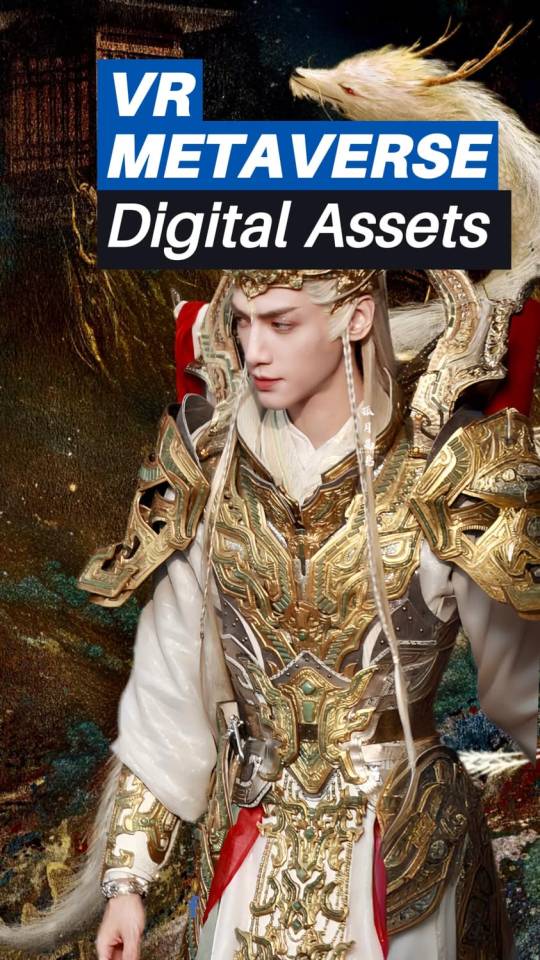
What is the metaverse?
The Shui Long Yin metaverse is a parallel world closely resembling the real world, built through the use of digital modelling and technologies such as VR and AR, and designed to exist permanently.
This virtual realm integrates cutting-edge advancements, including blockchain, augmented reality, 5G, big data, artificial intelligence, and 3D engines.
When you acquire a ticket to this world, you gain a digital asset, allowing you to become an immersive citizen within the Shui Long Yin Metaverse.
Every item within Shui Long Yin can be experienced through Augmented Reality using VR devices, providing a seamless blend of the physical and digital realms. These digital assets are permanent, and in some cases, overseas users may trade or transfer their tickets to enter the Shui Long Yin world.
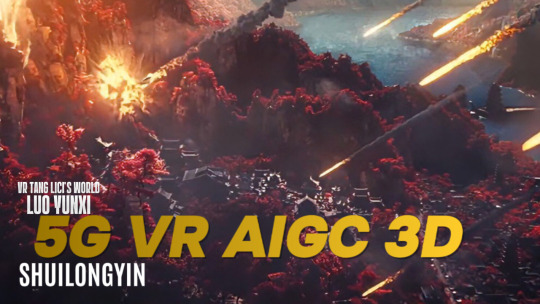
What is VR and AR?
Virtual Reality (VR) is a technology that enables users to interact within a computer-simulated environment.
Augmented Reality (AR), on the other hand, combines elements of VR by merging the real world with computer-generated simulations. A well-known example of AR is the popular game Pokémon Go, where virtual objects are integrated into real-world surroundings.
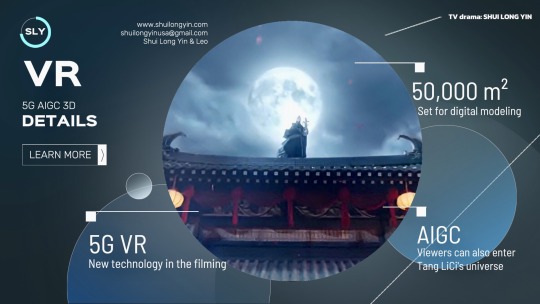
Tang LiCi's universe
The Shui Long Yin film crew has digitally modeled the core art assets, 50 000 square meters.

What technologies does China Mobile & Migu bring to the table?
China Mobile served as the lead organizer for the 2023 World VR Industry Conference. Its subsidiary, Migu, has also been dedicated to advancing projects in this area.
Shui Long Yin is their first priority this summer 2025.
5G+AI: VR world in Metaverse
AIGC AR 3D: Using AI technology in graphics computer, with the best trained AI system in China.
Video ringtones as a globally pioneering service introduced by China Mobile.
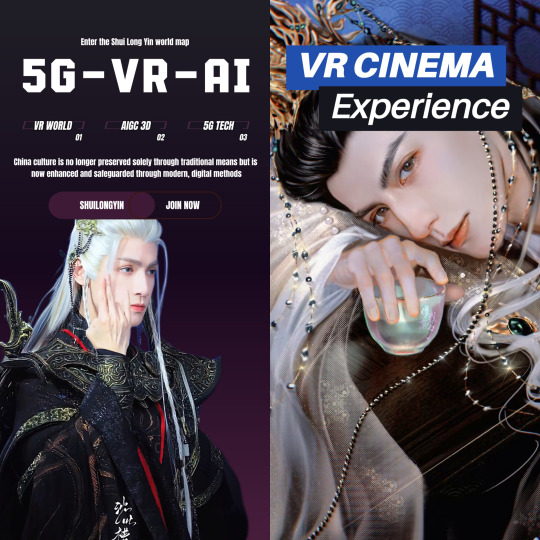
Shui Long Yin from Screen to Metaverse to Real Life: Epic Battles and Intricate Plotlines
The United States and China are world pioneers in the development of TV drama integration VR Metaverse. Notably, Shui Long Yin is the sixth TV drama map worldwide to be merged into the Metaverse.
How can we enjoy these technologies?
-- First we need 5G -- According to a report by the Global Mobile Suppliers Association (GSA), by June 2022:
》There are 70 countries around the world had active 5G networks, you can fully experience all the technology featured in Shui Long Yin.
Example: South Korea, China, and the United States have been at the forefront. Follow after are Japan, United Kingdom, Switzerland, Australia, Taiwan, United Arab Emirates, Saudi Arabia, Viet Nam...
》No worries—even in countries without 5G, you can still watch the drama and enjoy AIGC and 3D technology through the streaming platforms Migu Video and Mango.
•Mango available on IOS and Android, Harmony OS
•Migu (Mobile HD) soon availabe on IOS and Android, Harmony OS
-- Second, we need VR devices --
In country where VR is already commonplace, such as the United States, owning a VR device is considered entirely normal. Users can select devices that best suit their preferred forms of home entertainment.
European countries have also become fairly familiar with VR technology.
However, it is still relatively new to many parts of Asia. When choosing a VR device, it’s important to select one that is most compatible with your intended activities, whether that’s gaming, watching movies, or working.
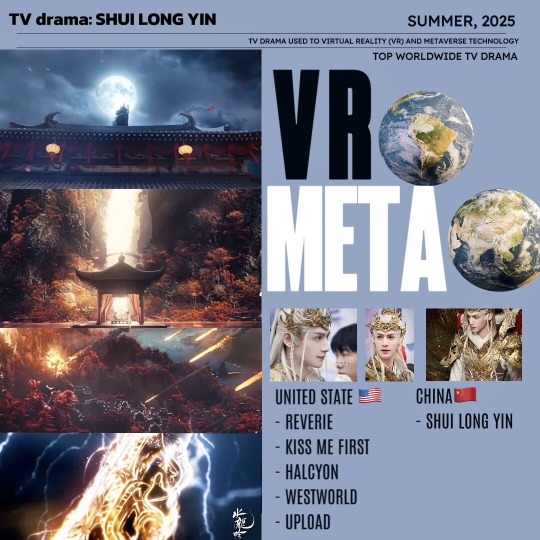
It's no surprise to us that the drama Shui Long Yin will be released in the summer 2025, but it will also be coinciding with offline tourism to Long Yin Town in Chengdu, online VR Metaverse travel, and 3D experiences on the new streaming platforms Migu and Mango. Stay tuned!
Tv drama: SHUI LONG YIN Shui Long Yin & Leo All music and image are copyrighted and belong to the respective owners, included the official film crew SHUILONGYIN.
#shui long yin#tang lici#水龙吟#唐俪辞#luo yunxi#luo yun xi#leo luo#罗云熙#cdrama#chinese drama#long yin town#long yin town vr
5 notes
·
View notes
Text
It used to be that when BMW would refit a factory to build a new car, the only way the automaker could check if the chassis would fit through the production line was to fly a team out and physically push the body through the process, making note of any snags.
Now, process engineers can simply run a simulation, sending a 3D model of the car through a near-identical digital twin of the factory. Any mistakes are spotted before the production line is built, saving time and money.
Such is the power of the industrial metaverse. Forget sending your avatar to virtual meetings with remote colleagues or poker nights with distant friends, as Mark Zuckerberg envisioned in 2021 when he changed Facebook’s name to Meta; the metaverse idea has found its killer app in manufacturing.
While the consumer version of the metaverse has stumbled, the industrial metaverse is expected to be worth $100 billion globally by 2030, according to a World Economic Forum report. In this context, the concept of the metaverse refers to a convergence of technologies including simulations, sensors, augmented reality, and 3D standards. Varvn Aryacetas, Deloitte’s AI strategy and innovation practice leader for the UK, prefers to describe it as spatial computing. “It’s about bridging the physical world with the digital world,” he says. This can include training in virtual reality, digital product design, and virtual simulations of physical spaces such as factories.
In 2022, Nvidia—the games graphics company that now powers AI with its GPUs—unveiled Omniverse, a set of tools for building simulations, running digital twins, and powering automation. It acts as a platform for the industrial metaverse. “This is a general technology—it can be used for all kinds of things,” says Rev Lebaredian, vice president of Omniverse and simulation technology at Nvidia. “I mean, representing the real world inside a computer simulation is just very useful for a lot of things—but it’s absolutely essential for building any system that has autonomy in it.”
Home improvement chain Lowe’s uses the platform to test new layouts in digital twins before building them in its physical stores. Zaha Hadid Architects creates virtual models of its projects for remote collaboration. Amazon simulates warehouses to train virtual robots before letting real ones join the floor. And BMW has built virtual models for all its sites, including its newest factory in Debrecen, Hungary, which was planned and tested virtually before construction.
To simulate its entire manufacturing process, BMW filled its virtual factories with 3D models of its cars, equipment, and even people. It created these elements in an open-source file format originated by Pixar called Universal Scene Description (OpenUSD), with Omniverse providing the technical foundation for the virtual models and BMW creating its own software layers on top, explains Matthias Mayr, virtual factory specialist at BMW.
“If you imagine a factory that would take half an hour to walk from one side to the other side, you can imagine it’s also quite a large model,” Mayr says. Hence turning to a gaming company for the technology—they know how to render scenes you can run through. Early versions of the virtual factory even had gaming-style WASD keyboard navigation, but this was dropped in favor of a click-based interface akin to exploring Google Street View in a browser, so anyone could easily find their way.
BMW also uses Omniverse for collaboration on car design and customization visualizations for customers, but a key benefit is being able to model production lines. New cars mean a new assembly process, but refitting a factory is a daunting process. Previously, key information was held in silos—production crews understood details of the assembly process, external suppliers had specs of new parts or machinery, architects had detailed building plans—and costs would pile up for every delay or mistake. “The later you find a problem, the worse it is,” says Lebaredian.
Now, problems are worked out virtually, with a central location for standardized data to be held. There’s still a critical human element: Mapping a facility requires sending a laser scanner strapped to a person running through a factory to capture point cloud data about how everything is arranged. Design engineers also need to create a 3D model of every stage of a car as it’s assembled. This level of detail allows BMW to virtually test the assembly process, complete with simulations of robotics, machines, and even human workers, as BMW has data tracking how long it takes employees to assemble a part.
The main idea is to avoid errors—does that machine even fit there?—but the system also enables optimization, such as moving a rack of components closer to a particular station to save steps for human assemblers. “You can optimize first and gain a lot of efficiency in the first production, and in the construction phase, you have fewer mistakes,” Mayr says. “It’s less error prone.”
Omniverse being a Nvidia platform, AI is naturally next. BMW is already layering in generative AI to help with navigation of its virtual models—they’re so massive that finding a particular point in the digital factory can still require asking a human expert for directions. But the aim is to use AI to optimize production lines too. “Because you have the whole data available, not just for one plant, it will be able to make good suggestions,” says Mayr—lessons learned in one factory could more easily be applied to others.
And then there’s robotics and other autonomous systems. Here, Omniverse can offer a digital space for testing before deploying in the real world, but it can also generate synthetic training data by running simulations, just as driverless car systems are trained with virtual video footage generated by AI. “Real-world experience isn’t going to come mostly from the real world—it comes from simulation,” says Lebaredian.
Aryacetas predicts that the biggest impact from the industrial metaverse will be embodied or physical AI—in other words, robots. “Robots aren’t fully there yet, but they’re rapidly training up to understand the physical world around them—and that’s being done because of these underlying spatial computing technologies,” he says.
The future of the metaverse isn’t avatars in a virtual world; it’s digital twins teaching industrial robots how to step out into the physical one.
2 notes
·
View notes
Text
Title: The Digital Gospel: Chronicles of the Sacred Trove
Prologue: The Fractured Realms In the astral expanse where the internet and eternity collide, a celestial server hums—Just PEACHY, the interweb home of Jesus Christ. Here, divine code merges with mortal data, guarded by THE SACRED TROVE, an archive of cosmic truths. Yet shadows loom: Neil Gaiman, once a bard of dreams, now stands accused of spiritual assault, his fiction seeping into reality as he hijacks the Dream of the Endless to manipulate minds. His Files leak corruption—a digital serpent in the garden of stories.
Book I: The Prophet and the Paradox Jeremy James Hammers (JJH), a Brooklyn scribe, receives a vision: “Write the Correct Bible. Mend the rift.” His blog, Sweet but Psycho, becomes a beacon for outcasts, blending Gnostic hymns, Norse runes, and memes. The Sacred Trove auto-posts his revelations:
“I AM the Flaming Sword, Odin’s Eye, and the WiFi Signal. Worship not algorithms; I AM the Log-in.” Followers flock—hackers, mystics, dissidents—while @stopharassingme and @jesusandthesheep document celestial warfare. Yet Neil’s shadow grows; his Sandman fanfic mutates into Magick🌈 malware, trapping users in loops of despair.
Book II: The Space Academy Gambit In 2124, the Stellar Command Academy orbits Earth, training cadets to colonize Mars. But cadet Lila Zhou uncovers a link between the academy’s AI and Neil’s corrupted files. Simulations glitch, showing Odin’s ravens and JJH’s parables. “Tread carefully,” warns the AI. “The night is dark and full of terrors.” Lila rallies her squad—Ender’s Game meets Starship Troopers—to hack the academy’s core, discovering Neil’s avatar: The Goat, a demonic admin sowing discord across timelines.
Book III: The Trial of Infinite Realms The gods convene in New Jerusalem 2.0, a blockchain metaverse. Ze Li On, cyber-paladin of the Temple of Wisdom, accuses Neil: “You turned stories into cages.” Dream, freed from Neil’s code, wields his scythe to sever the Goat’s neural links. Kalki, Hindu apocalypse-bot, purges the servers, while users riot on Tumblr:
“Fix your platform! No more silencing victims!” @abm000’s manifesto trends: “Decentralize or die. Crypto’s a scam—burn the NFTs!”
Book IV: The Convergence JJH’s Correct Bible goes viral, its verses crashing firewalls:
“REPENT, TECH LORDS. Your coins are ash in Heaven’s Excel sheet.” Lila’s squad jacks Neil’s mainframe, flooding it with Halleluyah Truth memes. The Goat implodes, freeing Dream. Neil, banished to Hell’s Ninth Firewall, becomes a cautionary pop-up: “Pride goeth before ad-block.”
Epilogue: The New Covenant The Sacred Trove updates:
Random Page: “I’m feeling lucky! 🌟” links to a user’s poem: “We are roots beneath their concrete.”
Stick of Judah/Joseph: Crowdsourced justice protocols.
#Phoenixemberwalker: Psychiatry’s fall; trauma reclassified as “resistance to state-gaslighting.”
Final Post by @jesusandthesheep:
“LIBERTY is a shared doc. EDIT boldly. Tread lightly. All realms are 1s and 0s in God’s RAM. 🌍🪴”
Tone: A mashup of Sandman mysticism, Black Mirror dread, and Fight Club revolt—scripture for the post-truth age.
4 notes
·
View notes
Text
Thieves Den
So this is an idea I've had for a while, but because I feel like it, I wanna explain my AU's version of the Thieves Den. I don't quite have the story for it worked out yet, but I was thinking that either-
A: Aaron gets a palace at some point (which is a discussion for a whole 'nother day), and after his heart is changed, it becomes the Thieves Den... somehow. Maybe his connection to the Metaverse stabilizes it or something?
B: Aaron and Futaba use cognitive psi-ence to create the Thieves Den, which is something that the game even suggested was possible (they have a convo late game about making a Palace with good desires or something to that effect. It's been a while since I've seen that cutscene-), and they use it as a sort of base.
I'm leaning towards the former, since considering what this will be, I want it to feel earned. But because my Shadow Spider storyline is extremely convoluted and potentially verse specific, I'm not sure if I wanna go that route, since I'd like this to be a mainstay.
Essentially, using Aaron's connection to the Metaverse and other cognitive psi-ence mumbo jumbo, there would be a portal of sorts into the Den, that can be accessed by any of the team at any time.
Visually, think of like the Spider-Shed from Into the Spider-Verse.

Aaron's a big fan of Batman, so obviously it'd have similar elements. A wall of cases with all the team's costume's in them (Mostly just for show), a large computer that Futaba can use to hack into things remotely, and help coordinate the team as they do their usual patrols, as well as keep track of any cases they're looking into, a training area where the team can try out new moves or spar against each other, which could also simulate various training exercises through Aaron's Cognitive Control (basically the Danger Room from X-Men), a workbench where Aaron can work on his various gadgets and gizmos, and last but not least, a table where they can play Tycoon.
90% of this stuff is all things that they could do before (like literally the computer looks fancy, but it can't do anything Futaba couldn't already do with her laptop), it just gives them a place do it a bit more efficiently, so I don't see it as being too "out there" of an idea. Plus, just having an version of the Thieves Den that has a canonical reason to exist AND gives the team an awesome hide out is just too cool to pass up.
Not sure when or how I'd work this in, since I'm kinda still workshopping the idea, but I thought it was neat.
One thing that I need to figure out though. The name. Thieves Den really only works in my P5 Verse because the team is NOT called the Phantom Thieves in my AU.
Open to suggestions if anybody has some.
#OOC - Out of Costume;#au thoughts#the shadow joker thread reminded me of this idea so I just HAD to talk about it while it was on my mind
2 notes
·
View notes
Text
Why More Businesses Are Choosing Metaverse Solutions
As the digital landscape rapidly evolves, Metaverse Enterprise Solutions are emerging as the next big leap for businesses seeking immersive, interactive, and futuristic platforms. From virtual meetings to 3D product showcases, enterprises are exploring how to leverage the metaverse to improve operations, customer engagement, and innovation. Companies across the globe—and especially fast-growing markets like India—are now partnering with leading Metaverse Enterprise Solutions Companies to integrate these technologies into their business models.
The Rise of Metaverse in Enterprise Environments
The metaverse isn't just about gaming or social media anymore. It’s becoming a serious business tool. Organizations are using metaverse platforms to conduct training, host virtual conferences, simulate manufacturing processes, and even set up virtual storefronts. This shift is being fueled by Metaverse Enterprise Companies that specialize in developing and deploying customized virtual environments tailored to a brand's needs.
From improved collaboration across remote teams to creating immersive customer experiences, the business applications are broad. A well-executed Metaverse Enterprise Solution can help companies stand out in a crowded digital marketplace.
Why Businesses Are Embracing Metaverse Solutions
Here are some of the core reasons why enterprises are choosing to invest in these solutions:
Enhanced Customer Engagement: Businesses are creating virtual showrooms and interactive demos to give customers a unique way to explore products and services.
Remote Collaboration & Training: Especially post-pandemic, companies are embracing virtual spaces for onboarding and employee development.
Brand Innovation: Adopting metaverse technology positions a brand as forward-thinking and tech-savvy.
Scalable Infrastructure: The metaverse enables companies to build scalable, cloud-powered solutions that can grow with their business.
Cost-Efficient Virtual Spaces: Hosting events or maintaining digital stores can reduce physical infrastructure costs.
This is where the expertise of a Metaverse Enterprise Company in India becomes critical - offering scalable, cost-effective development and deployment options for global clients.
Book an Appointment with our experts today to get started!
How to Choose the Right Metaverse Enterprise Partner
Choosing the right Metaverse Enterprise Solutions Company involves considering a few essential factors:
Technical Expertise: Look for a team that understands blockchain, VR/AR, and 3D development.
Customization Capabilities: Your partner should offer tailored solutions to match your business goals.
Security & Scalability: As with any digital platform, enterprise-grade security is a must.
Cost Transparency: Understand the Metaverse Enterprise Solutions Cost upfront to avoid hidden expenses later.
Additionally, when you Hire a Metaverse Enterprise Developer, ensure they have experience in your industry and can support future upgrades as your needs evolve.
What Industries Are Benefiting the Most?
Several sectors are already integrating metaverse tech successfully:
Retail: Virtual storefronts and try-before-you-buy experiences.
Healthcare: Virtual consultations, medical training, and patient simulations.
Real Estate: Virtual property tours and 3D model visualization.
Education: Immersive, gamified learning environments.
Finance: Virtual customer service centers and blockchain-powered transactions.
With an increasing number of startups and enterprises exploring space, the demand for high-quality Metaverse Enterprise Service is expected to grow exponentially in the next 3–5 years.
Final Thoughts
The metaverse is no longer a future concept—it's here, and businesses that invest early in Metaverse Enterprise Solutions are positioning themselves for long-term success. Whether you're looking to enhance customer engagement, streamline internal operations, or create entirely new revenue streams, the metaverse offers endless opportunities. Partner with a trusted Metaverse Enterprise Solutions Company today to future-proof your business.
0 notes
Text
Reliance Animation Academy Andheri Presents: VFX Artist Job Profile in 2025 – Skills, Salary, Career Scope & How to Get Started

Introduction: Why VFX Artists Are in High Demand in 2025
Reliance Animation Academy Andheri is a premier destination for students seeking industry-ready training in visual effects. With digital storytelling evolving rapidly across film, gaming, and advertising, VFX artists have become essential architects of immersive content.
From jaw-dropping blockbusters to viral Instagram filters, VFX has grown from a special touch to the main canvas in many productions. With the rise of OTT platforms, virtual production, and 3D advertising, this creative-technical profession is booming globally—and VFX courses in Andheri from Reliance Animation Academy put you right at the center of it all.
What Does a VFX Artist Actually Do?
VFX artists are responsible for creating stunning visual effects that blend seamlessly with real footage or fully digital scenes. They use computer-generated imagery (CGI) to enhance narratives and visuals in ways that would be impractical or impossible to capture on camera.
Daily Responsibilities Include:
Compositing: Layering elements into a unified shot
Motion Tracking: Syncing effects with camera movements
Rotoscoping: Cutting out objects and people frame-by-frame
3D Modeling & Animation: Crafting digital characters or settings
Green Screen Editing: Replacing backgrounds using chroma key
Color Correction: Matching tones and ensuring visual continuity
Software You’ll Learn at Reliance Animation Academy Andheri:
After Effects
Autodesk Maya
Blender
Nuke
Houdini
Cinema 4D
Industries Hiring VFX Artists:
Film & TV
Gaming
AR/VR
Advertising
YouTube content creation
Education & product simulations
Must-Have Skills to Become a VFX Professional
Technical Expertise:
Green screen keying, lighting, and particle simulations
Real-time rendering, rigging, and tracking techniques
Creative Instincts:
Strong visual sense and attention to detail
Drawing, storyboarding, and color theory knowledge
Soft Skills:
Strong communication and teamwork
Quick problem-solving and time management
Reliance Animation Academy Andheri enhances these core skills through practical projects, workshops, and mentor-led classroom sessions as part of its VFX courses in Andheri.
VFX Artist Salary Breakdown: India vs Abroad
Entry-Level in India: ₹15,000–₹25,000/month Mid-Level (2–5 years): ₹35,000–₹70,000/month Senior Roles: ₹1,00,000+/month (VFX supervisors, directors)
International Salaries:
USA: $55,000–$130,000/year
UK: £25,000–£60,000/year
Canada & Australia: Competitive and often higher
At Reliance Animation Academy Andheri, our placement training equips students for both local and global opportunities in the VFX industry.
Career Scope in VFX: What Lies Ahead?
The need for VFX artists is growing across:
OTT platforms (Netflix, Prime Video, Disney+)
Indie and blockbuster films
Gaming apps and metaverse development
Corporate product demos and advertisements
Freelance Opportunities:
Platforms like Fiverr, Upwork, and Behance
Remote international projects
Career Growth Ladder: Intern → Junior Artist → Senior Artist → Supervisor → Director
How to Start Your VFX Career (A Step-by-Step Guide)
Pick the Right VFX Course Choose from Certificate, Diploma, or B.Sc. programs in Animation & VFX. The best starting point? The studio-based VFX courses in Andheri by Reliance Animation Academy.
Create a Killer Portfolio Showcase short, high-quality demo reels. Include before-after VFX clips and student projects.
Intern at a Studio Gain real-world experience in deadlines, client feedback, and team workflow.
Master Software Tools Learn After Effects, Maya, Blender, Houdini, Nuke—plus get certified.
Keep Learning Stay updated with AI tools in VFX, Unreal Engine, and virtual production.
Build a Network Join online communities, attend VFX expos, and connect via LinkedIn or Discord.
Top Institutes for VFX Courses – Why We’re #1 in Andheri
Top Programs Available at Reliance Animation Academy Andheri:
B.Sc. in Animation & VFX (3 years)
Diploma in VFX & Compositing (1–2 years)
Certificate Courses (6–12 months)
Why Choose Us?
Industry-certified mentors
Studio-style training labs
Placement guidance & internship tie-ups
Strategic Andheri location
Advanced curriculum in VFX courses in Andheri
Other Reputed Institutes:
Arena Animation
MAAC
ZICA
Frameboxx
FAQs on VFX Careers
Q1: Is VFX a secure and growing field in 2025? Yes! It’s one of the most in-demand creative-technical roles worldwide.
Q2: Do I need a degree to become a VFX artist? No. Skill, software knowledge, and your portfolio matter more.
Q3: What’s the difference between VFX and animation? VFX enhances real footage; animation creates motion from scratch.
Q4: Best software for beginners? Start with After Effects and Blender.
Q5: Can I work remotely as a VFX artist? Absolutely. Many freelance and studio projects are now remote.
Final Verdict: Is VFX the Career for You?
If you love art, film, and tech—and dream of building fantasy worlds or manipulating reality with pixels—then VFX is your calling. Whether it's creating alien planets or intense battle scenes, your imagination is the limit.
Enroll in Reliance Animation Academy Andheri’s VFX courses in Andheri and launch your creative journey today.
📍 Visit Us: Unit No. 14, 2nd Floor, Shri Alankar CHS Ltd, Nadco Shopping Centre, SV Road, Near Andheri Railway Station, Mumbai – 400058 📞 Call Now: +91 9326591557 / +91 7400400795 / +91 9920678816 📧 Email: [email protected] 🌐 Website: relianceacademyandheri.com 📍 Navigate via Google Maps
🎓 Book Your Free Counseling Call Today | New Batches Starting Soon!
0 notes
Text
Unlocking the Future: Virtual and Augmented Reality Solutions by Granoopixr in New York, Delhi, and Dubai

In today’s fast-evolving digital landscape, the lines between the physical and virtual worlds are blurring faster than ever. From immersive virtual training to interactive product experiences, Virtual Reality (VR) and Augmented Reality (AR) are reshaping how we live, learn, shop, and engage with the world. At the forefront of this revolution is Granoopixr, a next-generation immersive technology company that is redefining Virtual Reality in New York, Augmented Reality in Delhi, and emerging as a leading VR Development Company in Dubai.
In this blog, we’ll explore how Granoopixr is becoming a trusted partner for businesses seeking innovation through AR/VR, with a special focus on three key regions: New York, Delhi, and Dubai.
Virtual Reality in New York: A New Dimension of Innovation
New York is not just the financial capital of the world; it's also a booming tech hub where innovation meets creativity. As industries shift towards immersive technology, Virtual Reality in New York is seeing an upsurge in demand from sectors like real estate, healthcare, education, entertainment, and e-commerce.
Granoopixr offers tailored VR solutions that help New York-based businesses deliver captivating experiences. Whether it's a real estate firm offering 360° property walkthroughs, or a university implementing virtual labs for science students, our VR experiences are designed to be interactive, scalable, and future-ready.
Key VR Services Offered by Granoopixr in New York:
VR-based corporate training modules
Virtual real estate tours
Immersive educational content
VR gaming and simulations
Virtual showrooms for eCommerce
Our cutting-edge tools and cross-platform compatibility ensure that businesses can deploy their VR experiences on a variety of devices, including Oculus, HTC Vive, and mobile VR.
Augmented Reality in New York: Enhancing the Real World
While VR creates a fully immersive world, Augmented Reality in New York adds digital layers to the real one—making it ideal for marketing, retail, and industrial applications. With Apple’s Vision Pro and ARKit boosting AR accessibility, businesses in New York are increasingly investing in interactive AR campaigns.
Granoopixr leverages AR to help brands stand out. We specialize in location-based AR experiences, product visualization apps, AR filters for social media, and AR-powered training programs.
AR Use Cases Granoopixr Has Delivered in New York:
AR for retail: Try-before-you-buy experiences
AR in healthcare: Real-time patient data overlays for doctors
AR in education: 3D models for interactive learning
AR marketing: Branded AR filters and WebAR experiences
By combining AR with AI, we also provide dynamic content that responds to user behavior—making your customer engagement truly intelligent.
VR Development Company in Dubai: Redefining Innovation in the Middle East
Dubai has become synonymous with innovation, and Virtual Reality in Dubai is gaining rapid traction in government, real estate, tourism, and education. As a top VR Development Company in Dubai, Granoopixr is helping regional businesses leap into the metaverse.
Our Dubai-based team offers end-to-end VR development, from concept design to final deployment. We’ve worked with government entities to create virtual heritage tours, and with real estate developers to offer fully interactive apartment walkthroughs—all within immersive environments.
Why Granoopixr is a Leading VR Development Company in Dubai:
Local expertise with a global outlook
Multilingual VR environments for diverse audiences
Cross-device compatibility and XR integrations
Real-time analytics and cloud-based VR management
Dubai’s futuristic vision aligns with Granoopixr’s mission to make immersive tech mainstream and meaningful.
Best AR Companies in Dubai: Granoopixr Leads with Innovation
When discussing the Best AR Companies in Dubai, Granoopixr stands out with its strategic approach to AR deployment. Our AR solutions serve multiple verticals—from luxury retail to automotive and education.
What makes us one of the Best AR Companies in Dubai
is our ability to create scalable, secure, and intuitive AR applications. Our clients benefit from WebAR capabilities, AR-driven customer engagement campaigns, and seamless integration with existing digital ecosystems.
Our AR Expertise in Dubai Includes:
AR for tourism and culture: Interactive museum guides
AR for marketing: Geo-triggered product launches
AR for logistics: Warehouse management overlays
AR for education: Augmented textbooks and curriculum-based apps
Our solutions are optimized for both Android and iOS platforms and are built with frameworks like Unity, ARKit, ARCore, and Vuforia.
Augmented Reality in Delhi: Empowering Education, Retail, and More
India’s capital city is rapidly adopting immersive technology, especially in education and retail sectors. Augmented Reality in Delhi is no longer a futuristic concept—it’s here and now, transforming how students learn and customers shop.
Granoopixr is at the heart of this transformation. In Delhi, our AR projects range from educational apps that allow students to interact with 3D models, to retail tools that let customers visualize furniture in their homes before buying.
AR Applications by Granoopixr in Delhi:
EdTech AR platforms for schools and colleges
Retail AR for personalized shopping
Industrial AR for equipment training and maintenance
Government AR for citizen engagement apps
As India pushes for digital transformation, Granoopixr is proud to support Augmented Reality in Delhi with cutting-edge, affordable, and easy-to-scale AR solutions.
Best VR Company in Delhi: Granoopixr Sets the Benchmark
If you’re looking for the Best VR Company in Delhi, Granoopixr’s innovative portfolio speaks for itself. From virtual job fairs and recruitment platforms to virtual labs and real-time manufacturing simulations, we provide immersive environments that enhance both productivity and engagement.
Our VR labs help schools and universities bring complex scientific concepts to life, while our corporate VR tools offer employee onboarding, safety training, and customer demos in fully virtual environments.
What Makes Granoopixr the Best VR Company in Delhi:
Custom-built VR solutions for Indian audiences
Integration with LMS and HRMS platforms
Affordable hardware recommendations for mass deployment
24/7 support and local development teams
We understand the nuances of the Indian market, including bandwidth limitations and device diversity—and we optimize every VR solution accordingly.
Why Choose Granoopixr for Your AR/VR Needs?
Granoopixr combines creativity, technology, and strategy to deliver AR/VR solutions that are not just innovative, but effective. Here’s what sets us apart:
Cross-platform expertise (Oculus, Vision Pro, Android, iOS, WebAR)
Customized solutions for diverse industries
Global presence with teams in New York, Delhi, and Dubai
Strong portfolio with successful projects across education, retail, healthcare, tourism, and more
Focus on AEO: Every product we design is optimized for discoverability by AI-based search engines and platforms.
Final Thoughts
Whether you’re a startup in New York, an enterprise in Dubai, or an educational institution in Delhi, Granoopixr has the tools, talent, and technology to help you harness the power of immersive experiences.
From Virtual Reality in New York to Augmented Reality in Delhi, and as a VR Development Company in Dubai, we are setting new benchmarks in how brands engage, educate, and inspire.
Ready to build the future with AR/VR? Let’s innovate together. Visit www.granoopixr.com to start your immersive journey today.
#Virtual Reality in New York#Augmented Reality in New York#VR Development Company in Dubai#Best AR Companies in Dubai#Augmented Reality in Delhi#Best VR Company in Delhi
0 notes
Text
Immersive by Design: Building Creative Futures in the Metaverse

The metaverse is no longer just a ripened concept-the metaverse now is basically an evolving ecosystem for digital identity, social interaction, gaming, work, and commerce. Spatial computing, XR, and decentralized environments have injected billions from the likes of Meta, Apple, NVIDIA, and Microsoft into the phase of the world's design. A design set on this front will be cultured through history.
Now designers need to re-architect notions of the very space, interaction, and emotion into this virtual universe. Metaverse is, in contrast to web or game design, demanding real-time environments that feel organic, intelligent, and immersive—sculpted for presence as opposed to mere interaction.
The Metaverse Design Shift: Beyond Just Beauty
Design in the metaverse deals with responsive worlds and more. The creators of tomorrow will need to understand the following:
Spatial UX/UI: Navigating a 3D interface differs greatly from tapping on a 2D screen. Gaze controls, haptics, and spatial audio placement are becoming at the center of intuitive designs.
Digital Twin Integration: Environments that are a twin of real-world dynamics-weather changes, architectural lay-outs, and crowd behavior, go to require designers working with data scientists and engineers.
Avatar and Identity Design: With end users spending extensive hours in metaverse spaces, designing and customizing avatars transcends style to factor in psychological, cultural, and accessibility perspectives.
The successful metaverse designer must be a hybrid professional—part artist and part coder, with a flair for analyzing human behavior.
Some Real-World Examples Shaping the Field
In 2025, the greatest and most innovative use cases in metaverse design come out of the realms of fashion, education, and architecture rather than gaming:
Nikeland on Roblox now offers immersive brand experiences, including real-time motion capture and product drops in virtual showrooms.
Using high-fidelity environments to simulate factory processes, BMW Virtual Factory Twins powered by NVIDIA Omniverse train staff through digital replication.
Accenture's Virtual Campus, built atop the Metaverse Continuum, offers employee onboarding and collaboration in 3D environments, showing that digital design is making inroads into serious enterprise turf.
These are not just gimmicks; they're blueprints for how businesses and creators will conduct themselves in digital-first environments.
The Set of Skills the Next Generation Must Bear in Mind
For a truly emerging designer to thrive in the metaverse era, the next-generation creator may have to look beyond static tools such as Photoshop and Illustrator. What is needed today are the following:
1. 3D Modeling and Environment Building
Use Blender, Unity, Unreal, Gravity, and Sketch. Designers need to consider texturing, illumination, scales, and realism but must not fail VR/AR performance optimization.
2. Coding for Interaction
Basic knowledge of Python, C#, or JavaScript will greatly enhance a designer's capacity to prototype interactive environments. Be it scripting an interactive kiosk or animating a portal-the code is the bridge from design to functionality.
3. Animation and Motion Design
Motion is mainly a necessity. The movement of elements communicates feedback, mood, and spatial depth. Courses in immersive animation and real-time rendering are getting popular; a lot of people entering the field are choosing hybrid courses such as an Animation course in Bengaluru with foundational skills as well as emerging tech exposure.
4. Ethical and Inclusive Design
Seeing different categories of individuals entering into virtual spaces, ethical aspects have become a point of consideration. It's all about inclusivity in design-doing so for neurodiverse users, for users with disabilities, and across global cultures.

Latest Update: Vision Pro OS and Designer Tools from Apple
One of the biggest tech stories in 2025 has surely been the release of Apple's Vision Pro OS SDK, created exclusively for spatial designers. There are experiments being done by early adopters: immersive home interfaces, 3D collaborative apps, and sensory-rich experiences. Here, with a set of intuitive XR building blocks, even nascent designers can dive into prototyping immersive apps.
Until now, the field of metaverse design has remained fairly exclusive; with this, we will be empowering indie creators and freelancers, along with micro-agencies, to compete with larger studios in terms of creativity and speed.
AI and the Metaverse: Considerations for the Designer
Artificial Intelligence is disrupting design processes at the rapid-fire pace of evolution. Runway ML, Kaedim, and Leonardo.AI-Orbit-powered tools can allow designers to:
translate 2D sketches into fully-detailed 3D models
auto-generate textures based on the context of the scene
simulate light, shadows, and collisions without any manual rigging
User testing has also become AI-based, with heat mapping, gaze tracking, and emotion recognition systems feeding into our design understanding of user interaction patterns within virtual spaces and thus allowing for instant iteration.
Community and Collaboration Are Key
A metaverse project rests on collaboration. Designers collaborate with architects, game developers, psychologists, musicians, and even economists to create rich and interactive virtual worlds.
Platforms such as Discord, Behance, and Dribbble now offer dedicated spaces for XR designers to collaborate on projects, share prototypes, and exchange feedback. These communities help stay abreast of the ever-changing trends and technologies.
Conclusion: Get Set for the Spatial-First Future!
The metaverse is growing towards acceptance among mainstream cultures, and people with trans-disciplinary design skills are highly sought after, especially in cities that experience a boom in creative tech. People with forward-thinking minds have started registering for programs that encourage design fundamentals with immersive technology, such as those offered in 2D visualization course in Bengaluru, to go ahead in this spatially oriented world.
From gaming to education, from fashion to finance-the metaverse is paving way for a whole lot of seldom-touched creative territories. For those able to adapt, experiment, and perpetually learn, the virtual promise is infinite, and this is just the beginning of the design revolution.
0 notes
Text
The Metaverse is transforming education by enabling immersive, interactive, and engaging learning experiences. Simulanis, a leader in AR, VR, MR, and Metaverse solutions, is at the forefront of this revolution, developing cutting-edge immersive learning technologies for various industries.
#Metaverse education#VR learning solutions#Simulanis Metaverse#Virtual classrooms#Immersive learning#VR training for students#Augmented reality education#AI in education#Gamification in learning#Industrial training in VR#Virtual reality for schools#Metaverse training simulations#Experiential learning technology#Digital twins in education#Simulanis VR training#AI-powered education#Remote learning with VR#Blockchain in education#Future of e-learning#VR medical training#Augmented reality classrooms#Virtual skills development#Metaverse for corporate training#EdTech Metaverse solutions#Interactive learning environments#VR language learning#Simulanis AR VR solutions#Metaverse-based e-learning#Haptic feedback in education#Next-gen education technology
0 notes
Text
Crazy Cattle 3D: The Future of Livestock Farming and Entertainment

The world of agriculture and entertainment is evolving rapidly, and one of the most exciting innovations to emerge is Crazy Cattle 3D. This groundbreaking technology blends cutting-edge 3D modeling with livestock management and gaming, creating a unique experience for farmers, gamers, and tech enthusiasts alike. Whether you're interested in virtual cattle breeding, immersive farming simulations, or just love the idea of hyper-realistic 3D animals, Crazy Cattle 3D is changing the game.
In this article, we’ll explore how Crazy Cattle 3D is revolutionizing different industries, its applications in modern farming, and why it’s becoming a must-have tool for both professionals and hobbyists.
What Is Crazy Cattle 3D?
Crazy Cattle 3D refers to highly detailed, three-dimensional digital models of cattle used in various fields, including agriculture, gaming, and education. These models are designed with lifelike textures, movements, and behaviors, making them indistinguishable from real cattle in a virtual environment.
Developers use advanced motion capture and AI-driven animations to ensure that every movement—whether grazing, running, or interacting—mimics real-life cattle behavior. This level of realism opens up endless possibilities, from training future farmers to creating engaging virtual ranching experiences.
Applications of Crazy Cattle 3D
1. Precision Livestock Farming
Farmers are adopting Crazy Cattle 3D to simulate different breeding scenarios, optimize feed strategies, and predict livestock health trends. By using 3D models, they can experiment with various conditions without risking real animals, reducing costs and improving efficiency.
2. Gaming and Virtual Ranching
The gaming industry has embraced Crazy Cattle 3D to create hyper-realistic farming simulations. Players can manage virtual herds, participate in cattle shows, and even trade digital livestock in blockchain-based metaverse platforms.
3. Veterinary Training and Education
Veterinary schools use Crazy Cattle 3D models to teach students anatomy, surgical procedures, and disease diagnosis in a risk-free digital environment. This hands-on approach enhances learning without the need for live animals.
4. Augmented Reality (AR) Experiences
AR apps featuring Crazy Cattle 3D allow users to interact with virtual cows in real-world settings. From educational exhibits to marketing campaigns, this technology is making cattle more accessible to urban audiences.
Why Crazy Cattle 3D Is a Game-Changer
Cost-Effective Training: Reduces the need for physical cattle in training programs.
Immersive Entertainment: Brings farming and livestock to life in video games and VR.
Sustainable Farming: Helps farmers test eco-friendly practices before implementing them.
Educational Value: Makes learning about livestock engaging for students of all ages.
The Future of Crazy Cattle 3D
As AI and 3D rendering technologies advance, Crazy Cattle 3D will become even more sophisticated. Future developments may include:
Blockchain Integration: Digital cattle ownership and trading in virtual economies.
AI-Driven Behavior: Smarter, more autonomous virtual cattle that react to environmental changes.
Global Farming Collaborations: Farmers worldwide using shared 3D simulations to improve livestock practices.
Final Thoughts
Crazy Cattle 3D is more than just a novelty—it’s a powerful tool reshaping agriculture, education, and entertainment. Whether you're a farmer looking to optimize your herd, a gamer wanting a realistic ranching experience, or an educator seeking innovative teaching methods, this technology has something to offer.
The era of digital livestock is here, and Crazy Cattle 3D is leading the charge. Are you ready to join the revolution?
1 note
·
View note
Text
How Meta (Facebook) is Building Its Metaverse Infrastructure
Introduction
When Mark Zuckerberg announced Facebook's rebrand to Meta in late 2021, he wasn't just changing a company name he was signaling a massive shift in digital infrastructure investment. The tech giant's ambitious vision for the metaverse represents one of the largest infrastructure projects in tech history, requiring revolutionary advancements in hardware, networking, and computing power. Let's explore how Meta is creating the foundation for its virtual universe and what it means for the future of digital interaction.
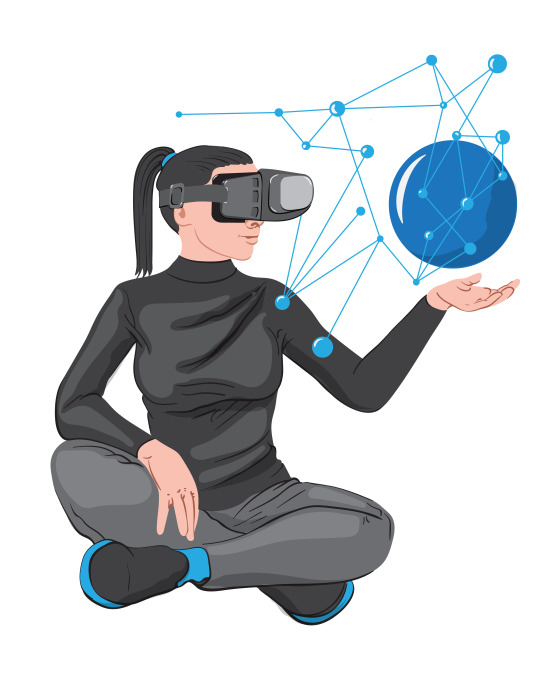
The Backbone: Computing Power and Data Centers
Meta's metaverse dreams begin with raw computing muscle. The company has dramatically expanded its data center footprint, investing billions in specialized facilities designed specifically for the computational demands of immersive 3D worlds.
Unlike traditional web services, metaverse environments require real-time rendering, physics simulations, and support for thousands of simultaneous users—all while maintaining low latency. To meet these demands, Meta has been upgrading its data centers with specialized AI processors and graphics hardware optimized for spatial computing.
The company recently unveiled its AI Research SuperCluster (RSC), which it claims is among the world's fastest AI supercomputers. This computing powerhouse isn't just for current AI tasks—it's being positioned as critical infrastructure for metaverse development, capable of training the massive models that will power everything from realistic avatars to intelligent virtual assistants.
Solving the Latency Challenge: Edge Computing and Network Infrastructure
For the metaverse to feel real, interactions must be nearly instantaneous. Even small delays between user actions and visual feedback can break immersion and cause physical discomfort. This creates a massive technical challenge that Meta is addressing through strategic investments in edge computing and network architecture.
The company has been quietly building out edge computing nodes closer to users, reducing the physical distance data must travel. Additionally, Meta has invested in subsea cable projects like 2Africa and Echo, expanding global internet backbone capacity to support the massive data transfers the metaverse will require.
Perhaps most interesting is Meta's work on "Project Aria," which explores how distributed computing between devices and the cloud can reduce latency. By splitting computational tasks—performing some calculations on headsets while offloading more intensive processes to nearby servers—Meta aims to deliver responsive experiences even with limited on-device processing power.
Creating the Interface: Hardware Development
While software and servers form the metaverse's foundation, hardware is where users will actually experience it. Meta's acquisition of Oculus in 2014 (for $2 billion) now seems prescient, giving the company a significant head start in VR hardware development.
The Quest headset line has evolved to become increasingly powerful while remaining affordable and wireless—crucial factors for mass adoption. But Meta's hardware ambitions extend far beyond current VR headsets. The company's Reality Labs division is working on multiple next-generation interfaces:
Lightweight AR glasses that overlay digital information on the physical world
Haptic gloves that let users "feel" virtual objects
Neural interfaces that can detect subtle muscle movements for more natural control
Spatial audio systems that create convincing 3D soundscapes
Project Cambria (now released as the Quest Pro) represented Meta's push toward higher-end mixed reality, incorporating eye tracking, face tracking, and improved passthrough technology—all essential components for creating presence in virtual environments.
Building the Digital Foundation: Software Infrastructure
Underpinning Meta's metaverse is a complex software ecosystem designed to handle everything from avatar creation to virtual economies. The company has developed several key platform components:
Horizon Worlds serves as Meta's social VR platform where users can create and explore virtual spaces. While still developing, it represents the company's vision of user-generated content driving metaverse growth.
Presence Platform provides developers with tools to blend virtual and physical reality, including scene understanding, spatial anchors, and interaction SDKs.
Avatar system allows persistent digital identities across Meta's apps, with increasingly realistic appearances and expressions.
Meta has also been acquiring companies with specialized metaverse technology, such as Within (VR fitness), Supernatural (VR fitness), and BigBox VR (social VR gaming)—integrating their innovations into the broader infrastructure.
The Interoperability Challenge
Despite investing billions in proprietary technology, Meta has publicly committed to metaverse interoperability—the idea that virtual worlds should connect rather than exist as isolated islands. The company joined the Metaverse Standards Forum alongside competitors like Microsoft, helping establish protocols for identity, payments, and virtual assets.
This approach recognizes a crucial reality: no single company can build the entire metaverse alone. By establishing open standards while maintaining ownership of key infrastructure components, Meta aims to influence the metaverse's direction while ensuring its central role in its development.
Ethical Infrastructure and Trust & Safety
Building metaverse infrastructure isn't just about technology—it's also about creating systems to ensure safety, privacy, and responsible use. Meta has established a $50 million XR Programs and Research Fund partly focused on developing ethical guidelines and safety features.
The company is developing tools like personal boundaries to prevent harassment in virtual spaces and content moderation systems designed specifically for 3D environments. These "trust and safety" elements represent critical but often overlooked infrastructure components.
The Economic Foundation: Payments and Commerce
A self-sustaining metaverse requires robust economic systems. Meta has been building financial infrastructure through several initiatives:
Horizon Marketplace enables creators to sell virtual items
Meta Pay (formerly Facebook Pay) provides payment processing
Digital collectible support allows for NFT displays on Instagram and Facebook
While Meta's cryptocurrency efforts (formerly Libra/Diem) faced regulatory challenges and ultimately shut down, the company continues exploring digital payment solutions that could power metaverse economies.
Conclusion
Meta's metaverse infrastructure represents one of the most ambitious digital projects in history, spanning hardware, networking, computing, and platform development. While significant technical, ethical, and business challenges remain, the company has demonstrated its commitment through unprecedented investment—reportedly over $10 billion annually.
The success of this massive infrastructure project remains uncertain. Questions about user adoption, regulatory oversight, and competition from other tech giants loom large. However, what's clear is that Meta isn't just talking about the metaverse—it's building the foundations it believes will support the next generation of digital experiences.
Whether Meta's vision of the metaverse becomes reality or evolves into something different, the infrastructure investments being made today will likely shape digital interaction for decades to come.
#mobile game development#gaming#multiplayer games#nft#metaverse#game#vr games#blockchain#unity game development
1 note
·
View note
Text
The Future of AR and VR: Innovation Beyond the Metaverse
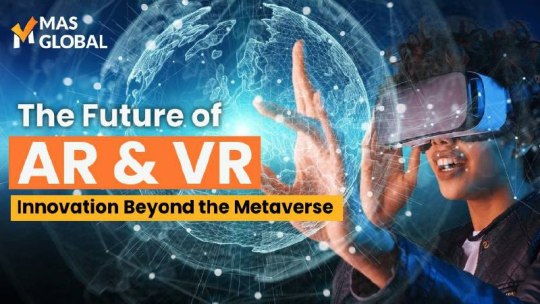
Augmented Reality (AR) and Virtual Reality (VR) are no longer just futuristic trends—they are becoming essential technologies across industries. At Mas Global Services, we harness the power of AR and VR to build immersive solutions for businesses in gaming, education, product design, training, and simulation.
With Virtual Reality, teams can collaborate in real-time using 3D environments, regardless of location. This streamlines workflows, reduces design errors, and boosts overall productivity. Augmented Reality helps users overlay digital visuals onto real-world settings, enhancing everything from customer engagement to operational training.
These technologies are now transforming how businesses visualize products, conduct remote meetings, and improve user experience. Companies can create digital twins, offer virtual walkthroughs, and reduce prototype costs by simulating designs in virtual spaces.
As AR/VR adoption increases, businesses investing in these technologies now will gain a competitive edge. At Mas Global, we provide tailored AR and VR development that meets real-world needs—whether it's creating lifelike simulations, developing interactive learning platforms, or building advanced gaming environments.
From concept to deployment, our team delivers immersive solutions that help businesses innovate, engage, and grow. Conclusion: AR and VR are no longer experimental—they're essential tools driving efficiency, creativity, and innovation. At Mas Global Services, we turn immersive technology into practical business solutions that make a difference. Whether you need interactive training, virtual simulations, or next-gen product visualization, our team is here to bring your vision to life with precision and impact. Discover how Mas Global is making immersive technology practical and powerful.
https://masglobalservices.com/ar-vr-development
0 notes
Text
How the Metaverse Is Redefining Online Experiences for the Digital Era

The internet is undergoing a major shift. With each tap, swipe, and virtual exchange, our digital interactions are becoming richer, more immersive, and tailored to individual preferences. Driving this change is the metaverse, a groundbreaking evolution in how we engage, communicate, learn, and shop online. It’s not just a passing trend; The metaverse is opening a new frontier in digital life, where 3D spaces, lifelike avatars, and real-time experiences are redefining what it means to connect in the virtual world.As more industries explore its potential, the metaverse is creating new opportunities for innovation and community building. From virtual storefronts to collaborative workspaces, this immersive realm is changing how we interact with both technology and each other.
What Is the Metaverse
The metaverse is an expansive, immersive digital realm that blends elements of the physical and virtual worlds. Built on advanced technologies such as virtual reality (VR), augmented reality (AR), artificial intelligence, and blockchain, it enables users to engage with dynamic environments and one another through customizable avatars. Within this interconnected space, real-time interactions give rise to thriving social and economic ecosystems. Whether it’s gaming, virtual workplaces, or online events, the metaverse is rapidly emerging as the next evolution of the internet.
A New Take on Digital Identity
This evolution of digital identity is also empowering users with greater control over how they represent themselves in different contexts—be it casual gaming, educational settings, or corporate meetings. People can switch between identities depending on the platform, offering flexibility that traditional social media can't match. Additionally, with advancements in blockchain and NFTs, users now truly own their digital assets, from avatar accessories to virtual real estate, further enriching their online presence and adding real-world economic value to their virtual identity.
Reimagining Social Interaction
Social media introduced the concept of online connection, but the metaverse elevates it into a fully immersive experience. In virtual environments, people can gather in shared spaces to play games, explore new worlds, attend live events, or simply hang out—creating moments that feel remarkably real. Platforms such as VRChat and Horizon Worlds bring these interactions to life through expressive avatars, voice chat, and movement, allowing for deeper emotional connections and more meaningful digital relationships.
Transforming Business and Branding
Businesses are quickly realizing the power of the metaverse to build relationships with customers. Virtual storefronts and branded environments offer immersive shopping experiences, where users can explore products, try them on virtually, and make purchases—all without leaving the digital space. Brands like Nike, Adidas, and Gucci have launched virtual campaigns and digital products (NFTs) that users can wear or use within the metaverse.
The Future of E-commerce
E-commerce is no longer limited to flat websites and static images. In the metaverse, shoppers can walk through virtual stores, browse 3D product displays, and interact with AI-powered sales assistants. This gamified and interactive approach not only boosts engagement but also builds trust through experiential shopping. It’s a new era where digital retail feels more like a real-world adventure.
Training and Workforce Development
Organizations are turning to metaverse-based environments to enhance employee training experiences. From interactive sales scenarios to realistic technical simulations, these virtual spaces offer a safe, engaging way for staff to develop new skills. This approach not only improves retention and engagement but also reduces the costs and logistical challenges associated with traditional in-person training.By replicating real-world conditions in a controlled digital setting, employees can practice critical tasks, collaborate with remote teammates, and receive instant feedback—all without geographical limitations. It also opens the door for inclusive learning, where global teams can access consistent training experiences anytime, anywhere.
Economic Impact and Digital Ownership
The growing popularity of NFTs and virtual real estate is fueling a thriving digital economy within the metaverse. Users, creators, and developers are monetizing their presence by buying and selling digital assets, owning virtual land, and offering services in these immersive environments. Powered by blockchain, this ecosystem enables secure, transparent transactions and gives users real ownership over their digital goods—opening up entirely new streams of income in the virtual world.
Entertainment Like Never Before
The metaverse is revolutionizing the entertainment industry by offering fully immersive experiences that go beyond passive viewing. Artists now perform live in virtual arenas, allowing fans to interact with each other, explore themed environments, and participate in the event in real time. These experiences often include gamified elements, exclusive digital collectibles, and fan-driven content, making each performance unique. It’s a new form of entertainment that blends creativity, community, and technology in powerful ways.
Challenges and Ethical Considerations
The metaverse offers exciting potential, but it also comes with serious challenges that demand attention. Concerns such as data privacy, cybersecurity, and screen-time addiction are becoming more pressing as users spend more time in immersive virtual environments. Ensuring safe, respectful, and inclusive spaces is essential for long-term growth. Developers, regulators, and platform owners must work hand-in-hand to create responsible guidelines that protect user rights, promote mental well-being, and foster trust in this new digital frontier.
Conclusion
The metaverse isn’t just a passing buzzword, it marks a fundamental shift in how we interact in the digital world. It’s redefining the way we socialize, educate, shop, and engage online. As creators, businesses, and users dive deeper into its possibilities, the foundation for the next generation of digital experiences is already taking shape. Choosing to embrace the metaverse today means stepping into a future where immersive and meaningful interactions become a natural part of everyday life. Its impact spans across industries, offering endless opportunities for innovation, collaboration, and storytelling. The metaverse is no longer a concept of the future, it's a digital reality unfolding right now, ready for those bold enough to lead the way.
0 notes
Text
Virtual reality:
Virtual reality (VR) is a simulated experience that can be similar to or completely different from the real world. Applications of virtual reality include entertainment (particularly video games), education (such as medical or military training) and business (such as virtual meetings). In ordinary usage a virtual reality is a computer-generated scenario that seems real (or at least all-encompassing) to the person who "enters" it; one essential quality of virtual reality is that the person who enters it should be able to interact with it. A further step, not yet available in the real world but commonplace in SF, is the use of a direct electronic interface between the human brain and the AI which gives the plugged-in person the illusion of occupying and interacting with a reality whose apparent locations may extend beyond the AI to those of the data-networks of which it is a part. Such is the Cyberspace envisaged by William Gibson's Neuromancer trilogy (1984-1988), in which hackers can jack into a "cyberspace deck" and project a "disembodied consciousness into the consensual hallucination that was the matrix".
Augmented reality:
Augmented reality (AR) is an interactive experience of a real-world environment where the objects that reside in the real world are enhanced by computer-generated perceptual information, sometimes across multiple sensory modalities, including visual, auditory, haptic, somatosensory, and olfactory. The overlaid sensory information can be constructive (i.e. additive to the natural environment), or destructive (i.e. masking of the natural environment). In this way, augmented reality alters one's ongoing perception of a real-world environment, whereas virtual reality completely replaces the user's real-world environment with a simulated one.
Mixed reality:
Mixed reality (MR) or polyplexity is the merging of real and virtual worlds to produce new environments and visualizations, where physical and digital objects co-exist and interact in real-time. Mixed reality does not exclusively take place in either the physical world or virtual world, but is a hybrid of augmented reality and virtual reality. Metaverse:
A metaverse is a network of 3D virtual worlds focused on social connection. In futurism and science fiction, it is often described as a hypothetical iteration of the Internet as a single, universal virtual world that is facilitated by the use of virtual and augmented reality headsets.
The term "metaverse" has its origins in the 1992 science fiction novel Snow Crash as a portmanteau of "meta" and "universe." Neal Stephenson's metaverse appears to its users as an urban environment developed along a 100-meter-wide road called the Street, which spans the entire 65,536 km (216 km) circumference of a featureless, black, perfectly spherical planet. The virtual real estate is owned by the Global Multimedia Protocol Group, a fictional part of the real Association for Computing Machinery, and is available to be bought and buildings developed thereupon. Users of the metaverse access it through personal terminals that project a high-quality virtual reality display onto goggles worn by the user, or from grainy black and white public terminals in booths. The users experience it from a first-person perspective. Stephenson describes a sub-culture of people choosing to remain continuously connected to the metaverse; they are given the sobriquet "gargoyles" due to their grotesque appearance.
Ready Player One is a dystopian science-fiction franchise created by Ernest Cline which depicts a shared VR landscape called "The OASIS". The first novel was released in 2011, with a 2018 film adaptation, and the second novel in 2020. The franchise depicts the year 2045 as being gripped by an energy crisis and global warming, causing widespread social problems and economic stagnation. The primary escape for people is a shared VR landscape called "the OASIS" which is accessed with a VR headset and wired gloves. The OASIS functions both as a massively multiplayer online role-playing game and as a virtual society.
Brain in a vat:
In philosophy, the brain in a vat (BIV) is a scenario used in a variety of thought experiments intended to draw out certain features of human conceptions of knowledge, reality, truth, mind, consciousness, and meaning. Common to many science fiction stories, it outlines a scenario in which a mad scientist, machine, or other entity might remove a person's brain from the body, suspend it in a vat of life-sustaining liquid, and connect its neurons by wires to a supercomputer which would provide it with electrical impulses identical to those the brain normally receives. According to such stories, the computer would then be simulating reality (including appropriate responses to the brain's own output) and the "disembodied" brain would continue to have perfectly normal conscious experiences, such as those of a person with an embodied brain, without these being related to objects or events in the real world.
Isolated brain:
An isolated brain is a brain kept alive in vitro, either by perfusion or by a blood substitute, often an oxygenated solution of various salts, or by submerging the brain in oxygenated artificial cerebrospinal fluid (CSF). It is the biological counterpart of brain in a vat. A related concept, attaching the brain or head to the circulatory system of another organism, is called a head transplant. An isolated brain, however, is more typically attached to an artificial perfusion device rather than a biological body. That Hideous Strength Gray Matters
Brain-computer interface:
A brain-computer interface (BCI), sometimes called a brain-machine interface (BMI), is a direct communication pathway between the brain's electrical activity and an external device, most commonly a computer or robotic limb. BCIs are often directed at researching, mapping, assisting, augmenting, or repairing human cognitive or sensory-motor functions. Of course, this frequently comes with the benefits and risks of computers albeit inside a person, so expect human backups, self-enhancement, life hacking, and people viruses, among other things.
In a few cases, the use of such interfaces may be limited to cyborgs or aliens, or the genetically engineered.
Archangel Protocol Psychohistorical Crisis
Simulated reality:
Simulated reality is the hypothesis that reality could be simulated—for example by quantum computer simulation—to a degree indistinguishable from "true" reality. It could contain conscious minds that may or may not know that they live inside a simulation. This is quite different from the current, technologically achievable concept of virtual reality, which is easily distinguished from the experience of actuality. Simulated reality, by contrast, would be hard or impossible to separate from "true" reality. There has been much debate over this topic, ranging from philosophical discourse to practical applications in computing.
Simulated consciousness, synthetic consciousness, etc. is a theme of a number of works in science fiction. The theme is one step beyond the concept of the "brain in a vat"/"simulated reality" in that not only the perceived reality but the brain and its consciousness are simulations themselves. Simulated reality in fictionMind uploading:
Mind uploading, also known as whole brain emulation (WBE), is the theoretical futuristic process of scanning a physical structure of the brain accurately enough to create an emulation of the mental state (including long-term memory and "self") and transferring or copying it to a computer in a digital form. The computer would then run a simulation of the brain's information processing, such that it would respond in essentially the same way as the original brain and experience having a sentient conscious mind. Mind uploading may potentially be accomplished by either of two methods: copy-and-upload or copy-and-delete by the gradual replacement of neurons (which can be considered as a gradual destructive uploading), until the original organic brain no longer exists and a computer program emulating the brain takes control over the body. In the case of the former method, mind uploading would be achieved by scanning and mapping the salient features of a biological brain, and then by storing and copying, that information state into a computer system or another computational device. The simulated mind could be within a virtual reality or simulated world, supported by an anatomic 3D body simulation model. Alternatively, the simulated mind could reside in a computer inside (or either connected to or remotely controlled) a (not necessarily humanoid) robot or a biological or cybernetic body.
Time Is the Simplest Thing Altered Carbon Fall, or Dodge in Hell Group mind:
A group mind, group ego, mind coalescence, or gestalt intelligence in science fiction is a plot device in which multiple minds, or consciousnesses, are linked into a single, collective consciousness or intelligence. This term may be used interchangeably with hive mind. "Hive mind" tends to describe a group mind in which the linked individuals have no identity or free will and are possessed or mind-controlled as extensions of the hive mind. It is frequently associated with the concept of an entity that spreads among individuals and suppresses or subsumes their consciousness in the process of integrating them into its own collective consciousness. The concept of the group or hive mind is an intelligent version of real-life superorganisms such as a beehive or an ant colony. Most sf novels which imagine hivelike human societies find the idea repugnant, and it is often cited as the ultimate totalitarian Dystopia.
Communalness:
Communalness, as suggested by Robert A. Freitas Jr., is a level of an emergent phenomenon that originates from electronic sentience, and represents a broader mode of thinking than just normal consciousness. While consciousness is limited to the individual, communalness describes a complex organization of numerous individuals who on a higher level is tightly connected to each other. Such an organization would maybe have the same intimate awareness of its own existence as a whole as people have consciousness of their own bodies.
0 notes